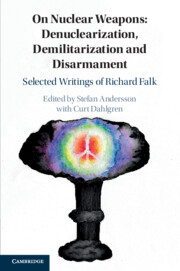 On Nuclear Weapons: Denuclearization, Demilitarization and Disarmament
On Nuclear Weapons: Denuclearization, Demilitarization and Disarmament Book contents
- On Nuclear Weapons: Essays by Richard Falk on Denuclearization, Demilitarization, and Disarmament
- On Nuclear Weapons: Essays by Richard Falk on Denuclearization, Demilitarization, and Disarmament
- Copyright page
- Dedication
- Epigraph
- Contents
- Foreword by Zia Mian
- Preface by Richard Falk
- Acknowledgments
- Part I International Law and World Order
- Part II Impacts of Democracy, Neutrality, and National Interest
- Part III Nuclear Policy Initiatives
- Part IV Remembering the Past, Encountering the Future
- Contents
- 16 The Paucity of the Millennial Moment
- 17 The Nuclear Challenge after Seventy Years
- 18 The Spirit of Thoreau in the Age of Trident
- Index
18 - The Spirit of Thoreau in the Age of Trident
from Part IV - Remembering the Past, Encountering the Future
Published online by Cambridge University Press: 04 July 2019
- On Nuclear Weapons: Essays by Richard Falk on Denuclearization, Demilitarization, and Disarmament
- On Nuclear Weapons: Essays by Richard Falk on Denuclearization, Demilitarization, and Disarmament
- Copyright page
- Dedication
- Epigraph
- Contents
- Foreword by Zia Mian
- Preface by Richard Falk
- Acknowledgments
- Part I International Law and World Order
- Part II Impacts of Democracy, Neutrality, and National Interest
- Part III Nuclear Policy Initiatives
- Part IV Remembering the Past, Encountering the Future
- Contents
- 16 The Paucity of the Millennial Moment
- 17 The Nuclear Challenge after Seventy Years
- 18 The Spirit of Thoreau in the Age of Trident
- Index
Summary
Henry David Thoreau went to jail in 1842 rather than pay a poll tax whose revenues were used, in part, to pay for US President James K. Polk’s colonialist war against Mexico. That long ago, Thoreau insisted that a citizen had a civic responsibility to oppose an unjust war: “The soldier is applauded who refuses to serve in an unjust war by those who do not refuse to sustain the unjust government which makes the war.” His more general counsel was to “let your life be a counter friction to stop the machine. What I have to do is to see, at any rate, that I do not lend myself to the wrong which I condemn.”
These days, rarely noticed except when prison terms are announced, there are a growing number of Americans who are dedicating their lives to stopping the machine. Now the machine has become undersized, and threatens, at least in our imagination, the ultimate human crime of omnicide, not an idle threat, given the validating findings of several groups of scientists about the prospects for “nuclear winter” in the aftermath of nuclear war. Unlike Thoreau who lives on in our tradition for his single night in a comfortable Concord jail (a friend paid his overdue tax to obtain his release), these unsung Americans, our contemporaries, some of whom have received long prison sentences and others have served time repeatedly for their status as career criminals of conscience, are remaining for years behind bars away from family, freedom, and work. Many are returning over and over again to put their bodies in the way of the machine.
- Type
- Chapter
- Information
- On Nuclear Weapons: Denuclearization, Demilitarization and DisarmamentSelected Writings of Richard Falk, pp. 348 - 361Publisher: Cambridge University PressPrint publication year: 2019
